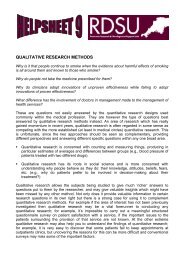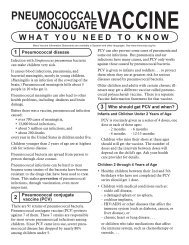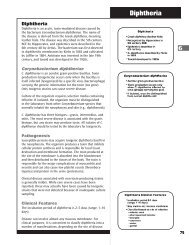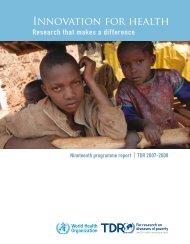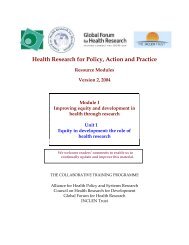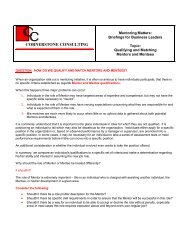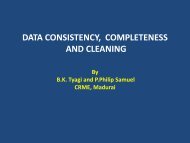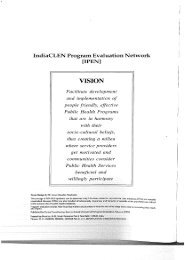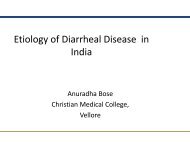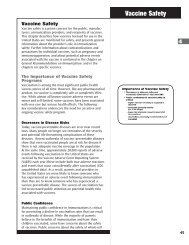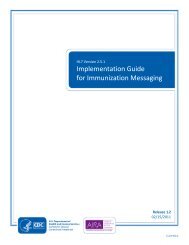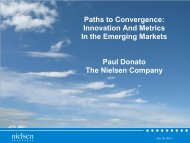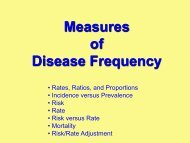Measles, Mumps, and Rubella - Centers for Disease Control and ...
Measles, Mumps, and Rubella - Centers for Disease Control and ...
Measles, Mumps, and Rubella - Centers for Disease Control and ...
Create successful ePaper yourself
Turn your PDF publications into a flip-book with our unique Google optimized e-Paper software.
22 MMWR May 22, 1998of the previous dose of measles-containing vaccine. An additional dose of MMR vaccinecan be administered as early as 1 month after the second dose. If otherwiseindicated, newly diagnosed HIV-infected children <strong>and</strong> adults without acceptable evidenceof measles immunity (Table 1) should receive MMR vaccine as soon as possibleafter diagnosis, unless they have evidence of severe immunosuppression (Table 2).Data indicate that, of the HIV-infected infants born in the United States annually,approximately 5% (i.e., 50 children per year) would be classified as severely immunocompromisedat age 12 months, when the first dose of MMR vaccine isrecommended.<strong>Measles</strong> vaccine is not recommended <strong>for</strong> HIV-infected persons with evidence ofsevere immunosuppression (Table 2) <strong>for</strong> several reasons:• a case of progressive measles pneumonitis occurred in a person with AIDS <strong>and</strong>severe immunosuppression to whom MMR vaccine was administered (134 );• evidence indicates a diminished antibody response to measles vaccine amongseverely immunocompromised HIV-infected persons (133 );• morbidity related to measles vaccination has been reported among persons withsevere immunosuppression unrelated to HIV infection (135–138 ); <strong>and</strong>• in the United States, the incidence of measles is presently very low.Serious illness associated with administration of rubella or mumps vaccines to HIVinfectedpersons has not been reported. MMR vaccine is not contraindicated <strong>for</strong> theclose contacts of immunocompromised persons. All family <strong>and</strong> other close contactsof HIV-infected persons should be vaccinated with MMR vaccine, unless they haveacceptable evidence of measles immunity.Severely immunocompromised patients <strong>and</strong> other symptomatic HIV-infected patientswho are exposed to measles should receive immune globulin (IG) prophylaxisregardless of vaccination status because they may not be protected by the vaccine.For patients receiving intravenous immune globulin (IGIV) therapy, a st<strong>and</strong>ard dose of100–400 mg/kg should be sufficient to prevent measles infection after exposures occurringwithin 3 weeks after administration of IGIV; <strong>for</strong> patients exposed to measles>3 weeks after receiving a st<strong>and</strong>ard IGIV dose, an additional dose should be considered.Although no data are available concerning the effectiveness of IGIV in preventingmeasles, high dose IGIV may be as effective as immune globulin administeredintramuscularly. Persons receiving regular (e.g., monthly) IGIV therapy <strong>for</strong> HIV infectionor other indications may not respond to MMR or its component vaccines becauseof the continued presence of high levels of passively acquired antibody (see Precautions<strong>and</strong> Contraindications, Recent Administration of Immune Globulin). If indicated,MMR vaccine should be administered at least 2 weeks be<strong>for</strong>e beginning IGIV therapy.Use of Vaccine <strong>and</strong> Immune Globulin Among Persons Exposedto <strong>Measles</strong>, <strong>Rubella</strong>, or <strong>Mumps</strong>Use of VaccineExposure to measles is not a contraindication to vaccination. MMR or measles vaccine,if administered within 72 hours of initial measles exposure, may provide some



